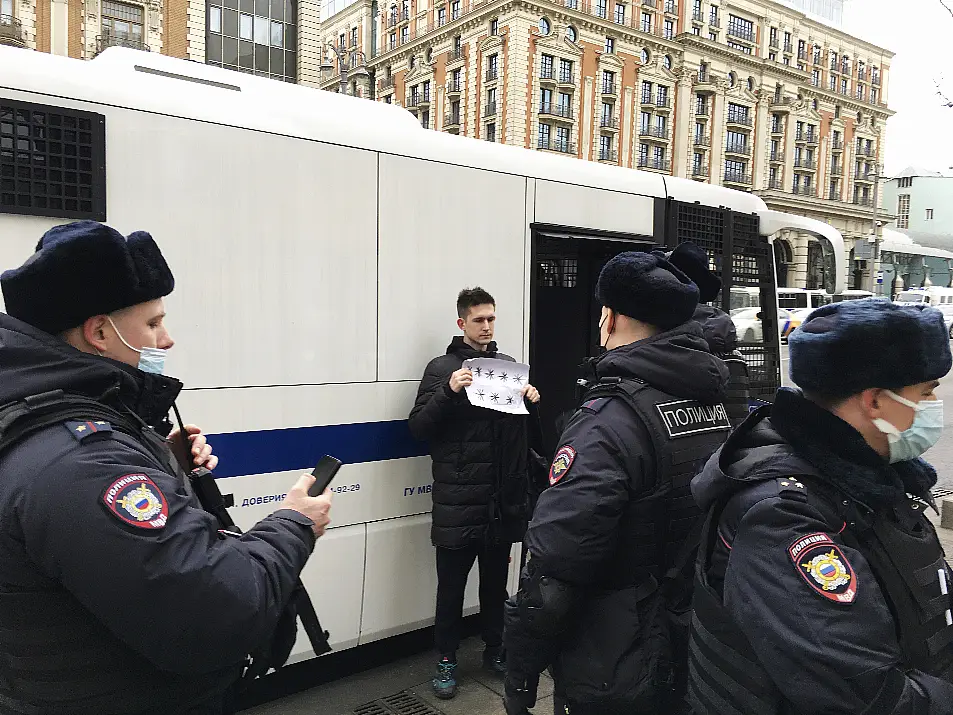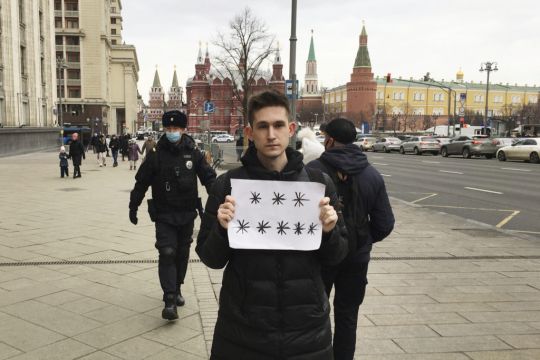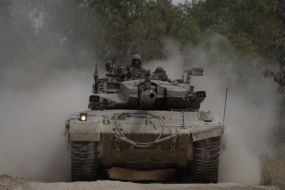Hundreds of Russians are facing charges for speaking out against the war in Ukraine since a repressive law was passed last month that outlaws the spread of “false information” about the invasion and disparaging the military.
Among them are a former police officer who discussed Russia’s invasion on the phone, a priest who preached to his congregation about the suffering of Ukrainians and a student who held up a banner with no words, just asterisks.
Human rights groups say the crackdown has led to criminal prosecutions and possible prison sentences for at least 23 people on the “false information” charge, with more than 500 others facing charges of disparaging the military that have either led to hefty fines or are expected to result in them.
“This is a large amount, an unprecedentedly large amount” of cases, said Damir Gainutdinov, head of the Net Freedoms legal aid group focusing on free speech cases, in an interview with The Associated Press.
The Kremlin has sought to control the narrative of the war from the moment its troops rolled into Ukraine.
It called the attack a “special military operation” and increased the pressure on independent Russian media that called it a “war” or an “invasion”, blocking access to many news sites whose coverage deviated from the official line.

Sweeping arrests stifled anti-war protests, turning them from a daily event in large cities like Moscow and St Petersburg into rare occurrences barely attracting any attention.
But reports of police detaining single picketers in different Russian cities come in almost daily and even seemingly benign actions have led to arrests.
A man was detained in Moscow after standing next to a Second World War monument that says Kyiv for the city’s heroic stand against Nazi Germany and holding a copy of Tolstoy’s War and Peace.
Another was reportedly detained for holding up a package of sliced ham from the meat producer Miratorg, with the second half of the name crossed off so it read Mir – peace in Russian.
A law against spreading “fake news” about the war or disparaging the military was passed by parliament in one day and took force immediately, effectively exposing anyone critical of the conflict to fines and prison sentences.
The first publicly known criminal cases over “fakes” targeted public figures like Veronika Belotserkovskaya, a Russian-language cookbook author and popular blogger living abroad, and Alexander Nevzorov, a TV journalist, film director and former politician.

Both were accused of posting “false information” about Russian attacks on civilian infrastructure in Ukraine on their widely followed social media pages, something Moscow has vehemently denied, insisting that Russian forces only hit military targets.
But then the scope of the crackdown expanded, with police seemingly arresting anyone.
Former police officer Sergei Klokov was detained after discussing the war with his friends on the phone. His wife told the Meduza news site that in casual conversation at home, Mr Klokov, who was born in Irpin near Kyiv and whose father still lived in Ukraine when Russian troops rolled in, condemned the invasion.
He was charged with spreading false information about the Russian armed forces and faces up to 10 years in prison.
St Petersburg artist Sasha Skolichenko also faces up to 10 years in prison on the same charge – she replaced price tags in a supermarket with anti-war flyers. On Wednesday, a court ordered her into pretrial detention for six weeks.
The Rev Ioann Burdin, a Russian Orthodox priest in a village about 185 miles north-east of Moscow, was fined 35,000 roubles (£320) for “discrediting the Russian armed forces” after posting an anti-war statement on his church’s website and talking to a dozen congregants during a service about the pain he felt over people in Ukraine dying.

He told AP his speech elicited mixed reactions. “One woman made a scene over the fact that I’m talking about (it) when she just came to pray,” he said, adding that he believed it was one of those hearing the sermon who reported him to the police.
Marat Grachev, director of a shop that repairs Apple products in Moscow, he displayed a link to an online petition titled No To War on a screen in the shop.
Many customers expressed support when they saw it, but one elderly man demanded it be taken down, threatening to report him to the authorities.
Police arrived and Grachev was charged with discrediting the military. A court ordered him to pay a fine of 100,000 roubles (£920).
Another court ruled against Moscow student Dmitry Reznikov for displaying a blank piece of paper with eight asterisks, which could have been interpreted as standing for No To War in Russian – a popular chant by protesters.
The court found him guilty of discrediting the armed forces and fined him 50,000 roubles (£460) for holding the sign in central Moscow in a mid-March demonstration that lasted only seconds before police detained him.
“It’s the theatre of the absurd,” his lawyer Oleg Filatchev told AP.
A St Petersburg court last week fined Artur Dmitriev for a sign containing president Vladimir Putin’s quote – albeit with a few words omitted for brevity – from last year’s Victory Day parade marking the defeat of Nazi Germany in the Second World War.
“The war brought about so many unbearable challenges, grief and tears, that it’s impossible to forget. There is no forgiveness and justification for those who once again are harbouring aggressive plans,” Putin had said, according to the Kremlin website.
Mr Dmitriev was fined 30,000 roubles (£275) for discrediting the Russian military. That prompted him to post on Facebook: “The phrase by Vladimir Putin, and ergo he himself … are discrediting the goals of the Russian armed forces. From this moment on, (internet and media regulator) Roskomnadzor must block all speeches by Putin, and true patriots – take down his portraits in their offices.”
Net Freedoms said that anything about the military or Ukraine can make a person a target. Even wearing a hat with the blue and gold of the Ukrainian flag or a green ribbon, considered a symbol of peace, have been found to discredit the military, the group said.
The Rev Burdin said the publicity about his case spread his message far beyond the dozen or so people who initially heard his sermon – the opposite of what the authorities presumably intended by fining him.
“It’s impossible to call it anything other than the providence of God,” the priest added. “The words that I said reached a much larger number of people.”







